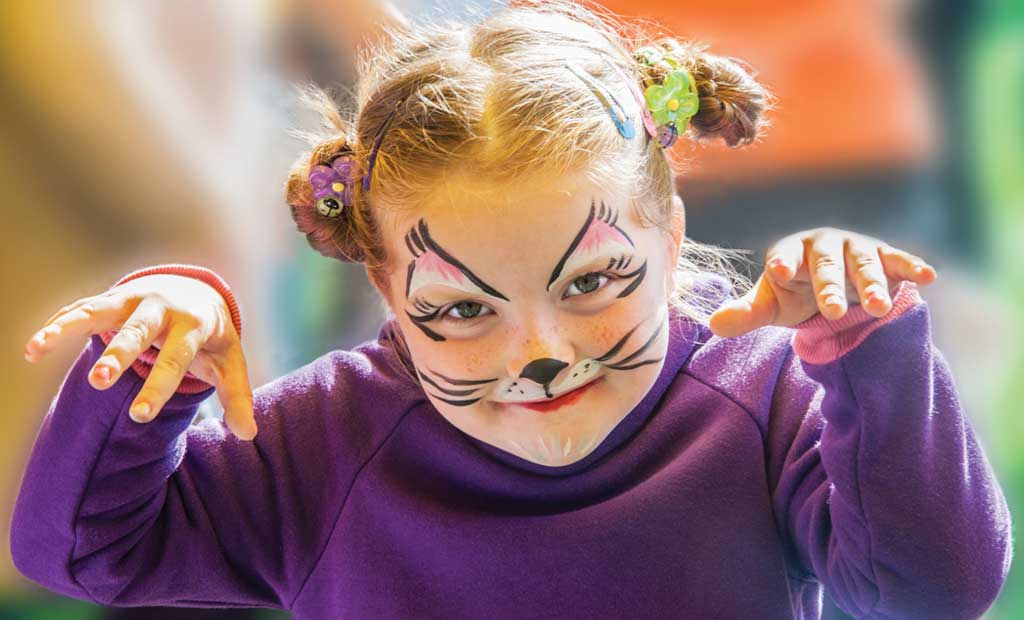Painting faces quickly and to a high standard is a challenge. If you don’t have volunteers with considerable experience, think about hiring a local professional to lead. Either agree on a flat rate or a percentage of the proceeds and put it in writing. As well as ensuring a high-quality result, your artist can help guide volunteers who have some face-painting experience.
Practise makes perfect
If you are relying solely on parent volunteers, it is important to have realistic expectations. Choose a limited number of simple designs and practise them many times so you can complete each one within three minutes per face. Volunteers with no prior experience can use online guides such as the one provided by face paints company Snazaroo. You can also find video tutorials on YouTube. Face-painting stalls are popular and you need to be fast to stop long queues forming. Don’t copy other artists’ designs without permission. You can buy templates on Etsy for a few pounds or create your own designs.
Insurance
If you are using volunteers, make sure your PTA’s insurance policy covers you. It should include coverage for professional cosmetics, but won’t cover household products such as craft glitter and Vaseline. These can be hazardous if they come into contact with someone’s eyes.
What to use
Only use products that comply with UK safety regulations. These include non-toxic, water-based face paints and cosmetic glitter with the correct fixing gel. Although biodegradable glitter is more expensive, it is an eco-friendly option. Biolumination sells a holographic, plant-based glitter that isn’t tested on animals and comes in eco-friendly packaging. Avoid using nail glitter on skin, and always make sure that cosmetics are within their use-by dates. Use dedicated face facepainting sponges or cut up natural sponges.
Manage the crowds
Let the children see the design options while they queue. Print them in colour and display them on boards or an A-frame. Appoint a queue manager to take payments, help children make a decision and close the queue if it’s getting too long. Offer a temporary tattoo to those waiting for over ten minutes.
- Risk assessments for PTAs
- Stall ideas for visitors of all ages
- Always-updated guide to summer fair games and stalls
Get consent
Before painting a child’s face, seek permission from both the child and caregiver. Paint manufacturers’ instructions specify a minimum age of three for face painting. If younger children are unable to sit still, offer a simpler design or a temporary tattoo on their arm or hand instead.
Discuss any concerns about illness, broken skin or potential allergic reactions with parents or guardians. Display a disclaimer and safety notice clearly on the stall. Use your judgment and say no if necessary.
In your comfort zone
A face-painting shift can be demanding if you are unable to reach the children’s faces easily. Create a set-up that works for both artist and child. Be safe and hygienic. Don’t reuse single-use stencils, put glitter on eyelids or reuse dirty sponges. Wash your brushes as you go and store them bristles-up in a jar. Use three pots of water for cleaning: one with antibacterial solution, one for rinsing and one with clean water. Collect dirty sponges in a mesh bag and wash them in a hot wash afterwards. Keep a bucket for dirty water and have a good supply of clean water as you will need a lot!
After care
Instruct parents to remove designs with child-friendly soap, warm water and a wash cloth. They should remove glitter and temporary tattoos with an alcohol-based hand sanitiser on damp skin.
Caz Robertson is a primary school parent who runs Cazzadoodle face painting in Wirral. She won Best Children’s Face Painter (Merseyside) at the Lux Global Excellence Awards 2023.
Learn to paint like a professional
- The Face Painting Association runs workshops and courses as well as an annual conference and convention.
- Donna’s Face Painting is currently taking bookings for a UK tour of classes.
- Façade Academy of Face Painting & Body Art offers the Personal Paint Path, where painters at any level can begin their journey or improve their skills.
Caz’s top suppliers








